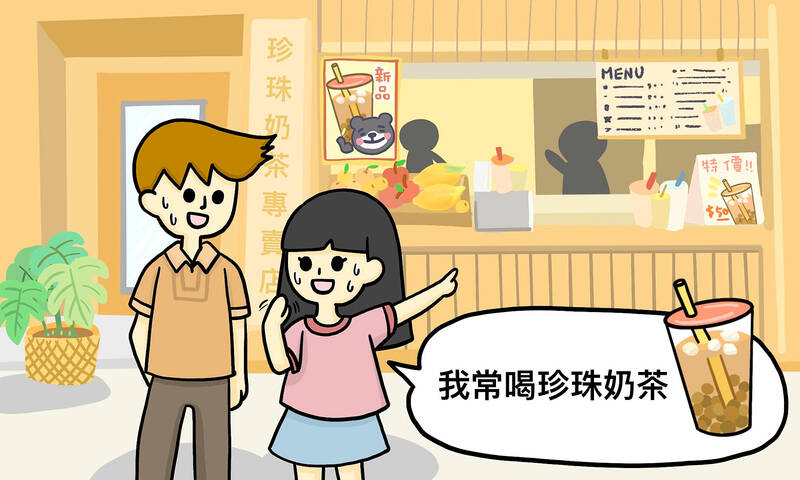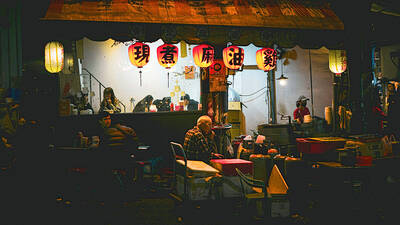對話 Dialogue
小實:天氣好熱啊,真想喝一杯冰冰的飲料!
Xiaoshi: Tiānqì hǎo rè a, zhēn xiǎng hē yì bēi bīngbīngde yǐnliào!

馬克:你常喝飲料嗎?
Make: Nǐ cháng hē yǐnliào ma?
小實::我常喝珍珠奶茶。
Xiaoshi: Wǒ cháng hē zhēnzhū nǎichá.
馬克:那是什麼啊?
Make: Nà shì shénme a?
小實:那是臺灣最有名的飲料,把甜甜的珍珠加到奶茶裡一起喝。
Xiaoshi: Nà shì Táiwān zuì yǒumíng de yǐnliào, bǎ tiántiánde zhēnzhū jiā dào nǎichá lǐ yìqǐ hē.
馬克:聽起來很好喝,可是我不喝茶。
Make: Tīngqǐlái hěn hǎo hē, kěshì wǒ bù hē chá.
小實:那你可以喝木瓜牛奶,也有很多人喜歡喝。
Xiaoshi: Nà nǐ kěyǐ hē mùguā niúnǎi, yě yǒu hěnduōrén xǐhuān hē.
馬克:好啊,我們等一下一起去買。
Make: Hǎo a, wǒmen děngyíxià yìqǐ qù mǎi.
翻譯 Translation
Xiaoshi: It’s so hot! I really want a cold drink!
Mark: Do you drink beverages often?
Xiaoshi: I usually drink milk tea with tapioca pearls.
Mark: What is that?
Xiaoshi: It’s the most famous drink in Taiwan. We add sweet tapioca pearls to milk tea and drink it together.
Mark: That sounds great, but I don’t drink tea.
Xiaoshi: Then you can drink papaya milk! Many people like to drink that, too.
Mark: OK, let’s go get some drinks together later.
單字片語 Vocabulary
1. 飲料 (yǐnliào) drink, beverage
2. 珍珠奶茶 (zhēnzhū nǎichá) milk tea with tapioca pearls
3. 有名 (yǒumíng) famous
4. 甜 (tián) sweet
5. 聽起來 (tīngqǐlái) sounds
6. 木瓜牛奶 (mùguā niúnǎi) papaya milk
教材音檔 Audio Files
教材影片 Video Files:
https://www.instagram.com/celc.nou_tw/guide/_/17999106352646292/
實踐大學華語中心提供
By Shih Chien University Chinese Language Center: https://chineseusc.com/

★ Bilingual Story is a fictionalized account. 雙語故事部分內容純屬虛構。 “Any New Year’s resolutions?” he asked. Lena put her coffee down. “Yeah,” she said. “To get in shape.... round is a shape, right?” Mark chuckled. “I support this. Fully achievable. Low risk.” “Thanks,” she smiled and lovingly rubbed her round belly. “I like a resolution I can’t fail.” “Funny thing is, I was thinking about getting round too.” Lena nodded her head in approval, “You could put some meat on those skinny bones of yours.” Mark shook his head, “Not that kind of round. Wheel-of-Life round.” She raised an eyebrow.

詞法—不定詞的誤用 1. 我得記住星期五要把報告寫好。 ˇ I must remember to finish my report by Friday. χ I must remember finishing my report by Friday. 註︰remember 後面跟動名詞或不定詞表示兩種不同的概念,與 forget 相類似。 試比較下列句子: I remember meeting him somewhere.(我記得曾經在某處見過他。) I must remember to meet him at the station at six this evening. (我必須記住今晚六點得去車站接他。) He remembered turning off the light when he left the room. (他記得離開房間時曾先把燈熄了。) Remember to turn off the light when you leave the room. (記住離開房間時要把燈關了。) 2. 他提醒她做好她份內的事。 ˇ He reminded her to do her job. χ He reminded her of doing her job. 註︰remind ... of ... 後面跟動名詞,表示「使人想起做過某事」。若是「提醒某人應做某事」,應用 remind ... to do ...。試比較下列句子: He reminded me of my attending the lecture last Friday. (他讓我想起我上星期五去聽過那次演講。) He

Skating is a popular recreational and competitive activity that involves sliding over surfaces using specially designed footwear. Its origins date back over 1,000 years to Northern Europe, where people first strapped animal bones to their feet to move across frozen lakes and rivers. In the 17th century, the Dutch transformed skating into a leisure activity. They also replaced bone blades with metal, leading to the creation of modern ice skates. Today, ice skating is enjoyed as a global sport and an exciting pastime by people of all ages. Figure skating is one of the best-known and most graceful forms of skating.

對話 Dialogue 清清:最近天氣越來越冷,感覺很容易感冒,要不要一起去吃薑母鴨或是羊肉爐? Qīngqing: Zuìjìn tiānqì yuèláiyuè lěng, gǎnjué hěn róngyì gǎnmào, yào bú yào yìqǐ qù chī jiāngmǔyā huòshì yángròulú? 華華:最近我覺得有點累,想吃薑母鴨,可是又怕一下子吃太補會上火。 Huáhua: Zuìjìn wǒ juéde yǒudiǎn lèi, xiǎng chī jiāngmǔyā, kěshì yòu pà yíxiàzi chī tài bǔ huì shànghuǒ. 清清:那我們去喝香菇雞湯吧,不太容易上火,喝了也會很暖和。 Qīngqing: Nà wǒmen qù hē xiānggū jītāng ba, bú tài róngyì shànghuǒ, hē le yě huì hěn nuǎnhuo. 華華:聽起來不錯!你們家平常冬天都吃什麼進補? Huáhua: Tīng qǐlái búcuò! Nǐmen jiā píngcháng dōngtiān dōu chī shénme jìnbǔ? 清清:我家都煮麻油雞,吃完整個人手腳都會熱起來。我也很久沒喝香菇雞湯了,正好可以去打打牙祭。 Qīngqing: Wǒ jiā dōu zhǔ máyóujī, chī wán zhěnggè rén shǒujiǎo dōu huì rè qǐlái. Wǒ yě hěn jiǔ méi hē xiānggū jītāng le, zhènghǎo kěyǐ qù dǎ dǎ yájì. 華華:可是我最近在減肥,會不會吃得太補,肉又長回來了? Huáhua: Kěshì wǒ zuìjìn zài jiǎnféi, huì bú